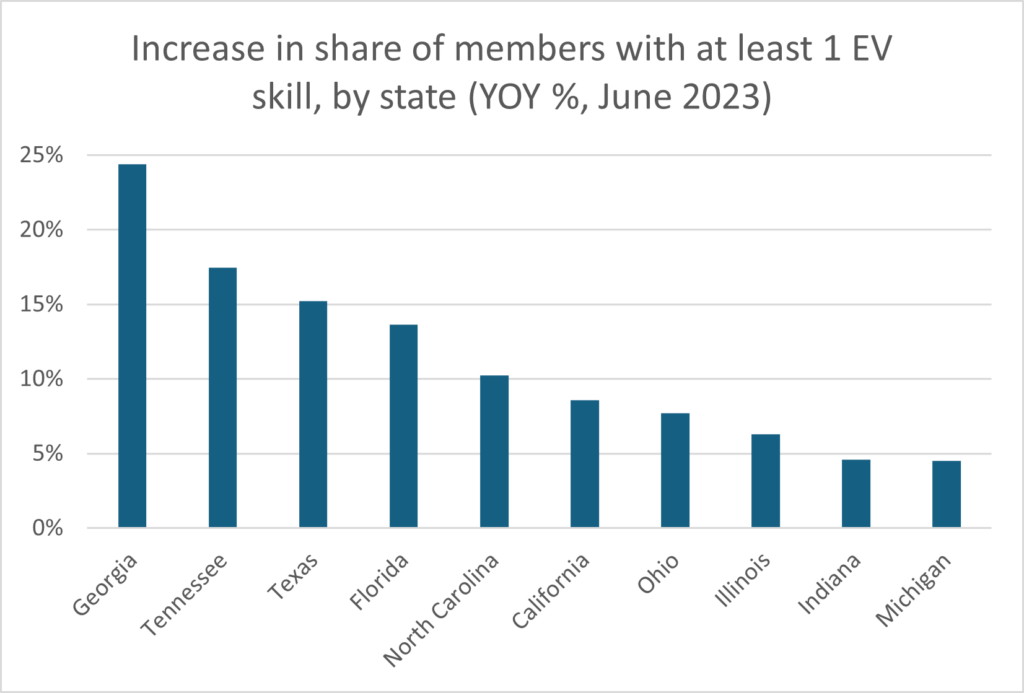Privately-sourced data will underpin efforts to improve talent pipelines and re-tool our economy. LinkedIn’s Data for Impact program shares skills insights with government and nonprofit partners as part of its commitment to the Industry Data for Society Partnership, which aims to address societal challenges by making private sector data more open and accessible.
Young people are excited to join the workforce and support the green transition–but they need the right skills to do so
19-year old Angel Miguel Arrellano Mendez will graduate college later this year with an engineering degree. Growing up in Ciudad Juarez, Mexico, Angel always knew he would end up working in one of the city’s hundreds of factories. Angel’s grandparents, like many in their generation, had moved to the city decades earlier in search of a better life working in the city’s industrial sector. Now, Angel’s future earnings as an industrial engineer are critical to his family’s financial security. Angel’s story illustrates the promise of his generation, Mexico’s largest and most educated ever, to move huge portions of the society into the middle class–if, and only if, they can get a good job.
As part of his university curriculum, Angel enrolled in a new college course on Energy Efficiency Fundamentals, developed by the International Youth Foundation (IYF) in partnership with Mexico’s Energy Efficiency Association. In this course, Angel began to see himself not only as the key to his family’s economic stability, but also “as a person who could help many people” by increasing the energy efficiency of his city’s factories and reducing their environmental impact. Re-tooling not just the factories of Ciudad Juarez but the entire global economy will take millions of Angels over the next few decades. Luckily, today’s generation is the largest and most educated generation the world has ever seen; in fact, there are 1.2 billion young people waiting in the wings to power the energy transition.
Private sector data can help illuminate the path to a green transition
Like IYF, LinkedIn aims to connect millions of aspiring workers like Angel with productive, sustainable, and transformative employment. Drawing insights from the 950M members on its platform, LinkedIn’s Economic Graph and Research Institute seeks to identify the jobs and skills that underpin green transitions in various industries. In coordination with the World Business Council’s Zero Emission Vehicle – Emerging Markets Initiative, LinkedIn mined data related to the Electric Vehicle (EV) transition and worked with IYF to validate a list of EV-specific skills. The creation of an EV skills list enabled LinkedIn to explore how EV skills have expanded across the workforce, and how they might compare with EV skill demand.

Tuning privately-sourced data with industry-specific expertise
IYF considers the Mexican auto industry a strategic partner in youth employment programming due to its scale and the high quality of its jobs. The industry (including auto parts) generates 4% of Mexico’s GDP and employs 1.6% of the national labor force, often with highly competitive salaries. For example, in Mexico’s “Motor City”, Puebla, automotive workers earn 30% more than their peers in other manufacturing industries. As positions become more specialized, salaries trend upwards. As the industry shifts towards electric vehicle production, IYF anticipates that specialized EV jobs will continue this trend.
Given the importance of the Mexican auto industry, IYF closely tracked its shift towards EV production and observed significant changes by late 2022. Eight assembly plants had already started production of electric cars, with plans for 180 more plants in the works. Tesla announced the construction of an assembly plant in Nuevo Leon and the Mexican government began expanding its portion of the Santa Teresa, New Mexico port in anticipation of explosive growth in EV spare part manufacturing.
The scope, scale, and speed of the industry’s transformation required IYF to identify critical skills for this emergent sub-industry as quickly as possible. Based on industry reports and key informant interviews, IYF drafted a preliminary set of skills for entry-level electric vehicle and parts workers. With data from LinkedIn, IYF was able to 1) refine its preliminary list of critical skills, 2) understand the degree to which those skills have permeated the labor pool by state, and 3) assess how the skill diffusion has changed over time. IYF interviewed manufacturers of EVs and EV parts to fine-tune this list of critical skills and root it in industry-specific needs.
Later this fall, IYF will facilitate a skills gap workshop with automotive and auto parts firms from across Mexico to prioritize the new critical skills. Then, working hand in hand with industry, IYF will develop new curricula and prepare instructors to teach those skills not currently offered in industrial degrees. In 2024, IYF will pilot the new curriculum in public schools before scaling the curriculum through public school systems across Mexico and bringing training resources like these to the US and beyond. This work also advances the broader skilling goals of IYF’s global partnership with Microsoft Philanthropies.
A private sector skills transition to fuel the green transition
Around the world, only one in eight workers has one or more green skills. Put another way, seven in eight workers lack even a single green skill. And while the share of green talent in the global workforce did grow by 12.3% between 2022 and 2023, the share of job postings requiring at least one green skill grew by 22.4% in the same period, nearly twice as quickly[1]. And this trend is not new: the share of green talent grew by 5.4% annually between 2018 and 2023, while the share of jobs requiring at least one green skill grew by 9.2% in the same period. The increase in demand for green skills is outpacing the increase in supply, raising the prospect of an imminent green skills shortage.
Building the talent pipeline that industry requires depends upon an organized private sector with a clear call to action for education and training systems. An industry that can clearly articulate its top 3 skills gaps will better align curricula to its needs than an industry that relies on public education and training systems to independently discern where the most acute skills gaps exist. Drawing on a diverse set of data sources, including LinkedIn, IYF serves as an honest broker between industry and education and training systems to identify and bridge skills gaps at the scale and speed required for economic transformations.
Members of the Industry Data for Society Partnership contribute privacy-preserving data from a range of sectors–consumer goods, utilities, tech–to support resilient, equitable, and sustainable development. The LinkedIn-IYF partnership serves as a model for how actors from the private, public, and non-profit sectors can collaborate to support individuals like Angel while advancing a just green transition that benefits his entire generation and the ones to come.
[1] 12.3% and 22.4% are global medians based on the countries available in LinkedIn’s analysis of the workforce.
